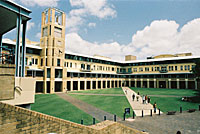 |
|
 |
| |
| |
| |
| |
| |
| |
| |
Campus: College of Fine Arts Campus
| |
| |
Career: Undergraduate
| |
| |
Units of Credit: 6
| |
| |
| |
| |
Contact Hours per Week: 3
| |
| |
| |
| |
| |
 |
|
 |
Description
Visual Images have often played a significant role in cultural conflicts on a local, national and, more recently, global scale. Most recently public images have been the subject of accusations of blasphemy and counter claims to freedom of expression. These very public, and well-publicised disputes have highlighted the potential that images have to engender and exacerbate cultural, political and religious conflict. Such conflicts suggest that while the world has grown more connected via communication systems, the potential for clashes has also increased. The course will provide students with the analytic skills needed to understand the role of the image in conflicts involving a range of cultural differences. It will examine historical instances such as the iconoclastic period in 9th century Turkey and the English iconoclastic movement, as well as contemporary situations such as the representation of religious images in the post 9/11 world, the role of images in the construction of Aboriginality in Australia and the representation of genocidal evidence by artists and in museums.
Course Outline
|

